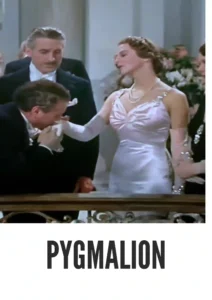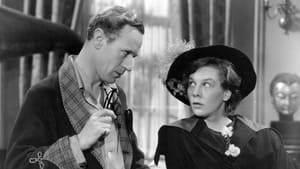Video Sources 0 Views

Synopsis
Language, Class, and Transformation: Pygmalion (1939) in Stunning Color

Step into the sophisticated world of George Bernard Shaw with Pygmalion, a witty social satire from 1939, now beautifully colorized for a viewing experience that enhances its timeless themes. Starring Leslie Howard and Wendy Hiller, this film, also known as Pygmalion: A Romance in Five Acts, delivers a sharp commentary on class, language, and societal transformation. Perfect for classic film enthusiasts and those who appreciate intelligent storytelling, this HD download brings a beloved play to cinematic life.
Pygmalion Storyline: A Daring Experiment
Pygmalion follows the story of Professor Henry Higgins (Leslie Howard), a phonetics expert who makes a bet that he can transform a Cockney flower girl, Eliza Doolittle (Wendy Hiller), into a “lady” simply by teaching her to speak properly.As Higgins subjects Eliza to rigorous lessons in elocution and etiquette, she gradually begins to master the art of speaking like an upper-class woman. However, Eliza’s transformation goes beyond mere speech; she develops a sense of self-worth and independence that challenges Higgins’s controlling nature. The film explores themes of social mobility, identity, and the power of language to shape one’s destiny. As Eliza blossoms into a confident and articulate woman, Higgins must confront his own prejudices and recognize her as an equal. Pygmalion is a thought-provoking and entertaining story about personal growth and the complexities of human relationships.
Movie Cast
The film features a stellar cast of actors who bring these iconic characters to life:
- Leslie Howard as Professor Henry Higgins
- Wendy Hiller as Eliza Doolittle
- Wilfrid Lawson as Alfred Doolittle
- Marie Lohr as Mrs. Higgins
- Scott Sunderland as Colonel Pickering
Movie Genre
Pygmalion falls into the genre of social satire, with elements of romantic comedy and drama that highlight the wit and intelligence of George Bernard Shaw’s original play. Its sharp dialogue and insightful commentary on class distinctions make it a captivating and thought-provoking film.
Historical Context: From Stage to Screen
Released in 1939, Pygmalion is an adaptation of George Bernard Shaw’s acclaimed play of the same name, showcasing the enduring appeal of his work. The film was produced during a period when British cinema was gaining international recognition. Pygmalion offers valuable insights into the social and cultural attitudes of the time, reflecting the rigid class structures and evolving roles of women in society.
Colorization Details
This colorized version of Pygmalion has been meticulously restored using modern digital techniques, enhancing the visual appeal while preserving the film’s original charm and sophistication. The colorization process involved carefully analyzing the grayscale tones of the original black and white footage and assigning appropriate colors to each scene. While the specific software used remains proprietary, the techniques employed included advanced algorithms for color palette selection and image enhancement. This painstaking process brings new life to the characters and settings, making the story even more engaging for modern audiences.
Technical Details
- Director: Anthony Asquith, Leslie Howard
- Screenplay: W.P. Lipscomb, Cecil Lewis, George Bernard Shaw
- Based on: the play by George Bernard Shaw
- Cinematography: Harry Stradling Sr.
- Edited by: David Lean
- Production Company: Pascal Film Productions
- Distributed by: Metro-Goldwyn-Mayer
- Runtime: 96 minutes
Technical Specifications
- Download Format: MP4
- Resolution: HD (1080p)
- Compatibility: Compatible with most devices, including smartphones, tablets, computers, and smart TVs.
Reviews and Critical Reception
Pygmalion (1939) is widely regarded as a cinematic triumph, earning critical acclaim and commercial success upon its release. The film was praised for its faithful adaptation of George Bernard Shaw’s play, as well as its outstanding performances, witty dialogue, and insightful social commentary. Pygmalion remains a beloved classic of British cinema, celebrated for its timeless themes and enduring appeal.
FAQs
- Q: What is Pygmalion about?
- A: Pygmalion is a social satire about a phonetics professor who bets that he can transform a Cockney flower girl into a “lady” by teaching her to speak properly.
- Q: Is Pygmalion (1939) a faithful adaptation of George Bernard Shaw’s play?
- A: Yes, Pygmalion is widely regarded as a faithful and brilliant adaptation of Shaw’s play, capturing its wit, intelligence, and social commentary.
- Q: Is this version of Pygmalion colorized?
- A: Yes, this version has been professionally colorized to enhance the viewing experience, bringing new life to the characters and settings.
- Q: What makes Pygmalion interesting for classic film fans?
- A: Pygmalion offers a brilliant adaptation of a beloved play, showcasing outstanding performances, witty dialogue, and insightful social commentary.
- Q: What is the download format?
- A: The download format is MP4, which is compatible with most devices.
- Q: What resolution is the download?
- A: The resolution is HD (1080p), providing a high-quality viewing experience.
Download Now in HD!
Watch Pygmalion Today!










